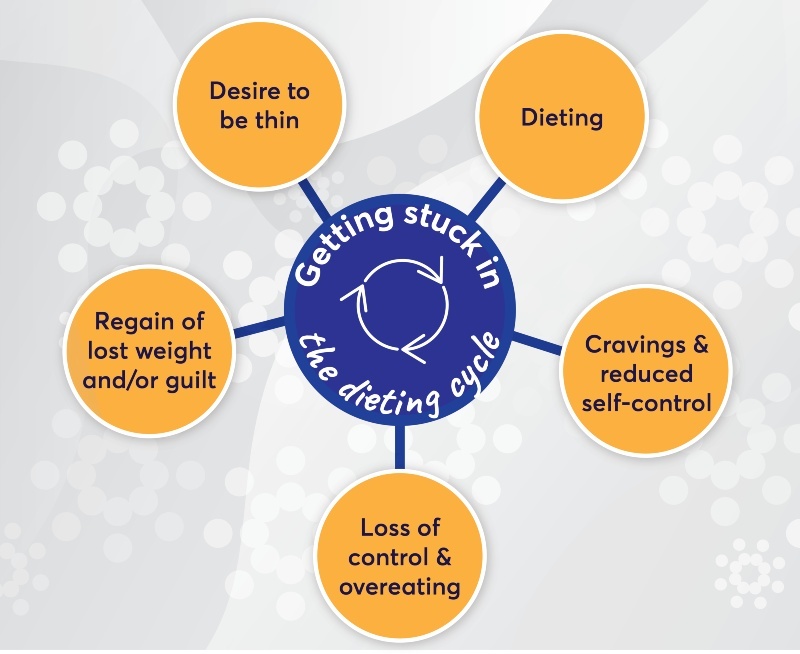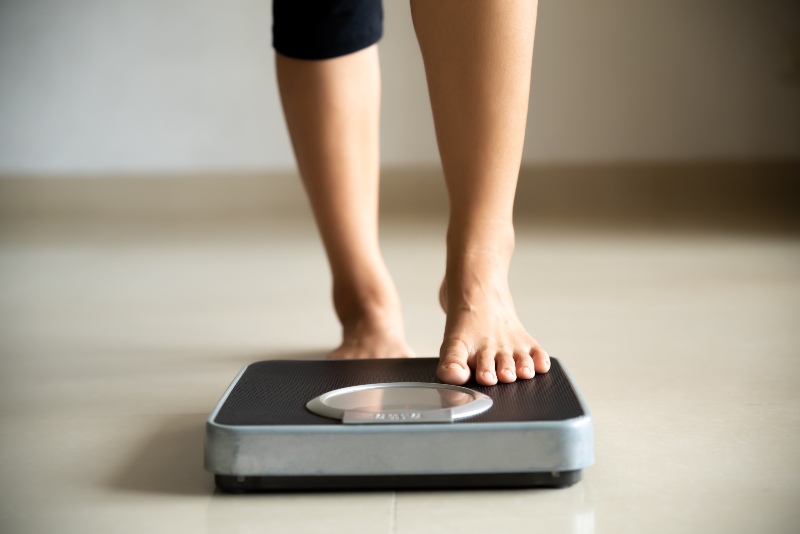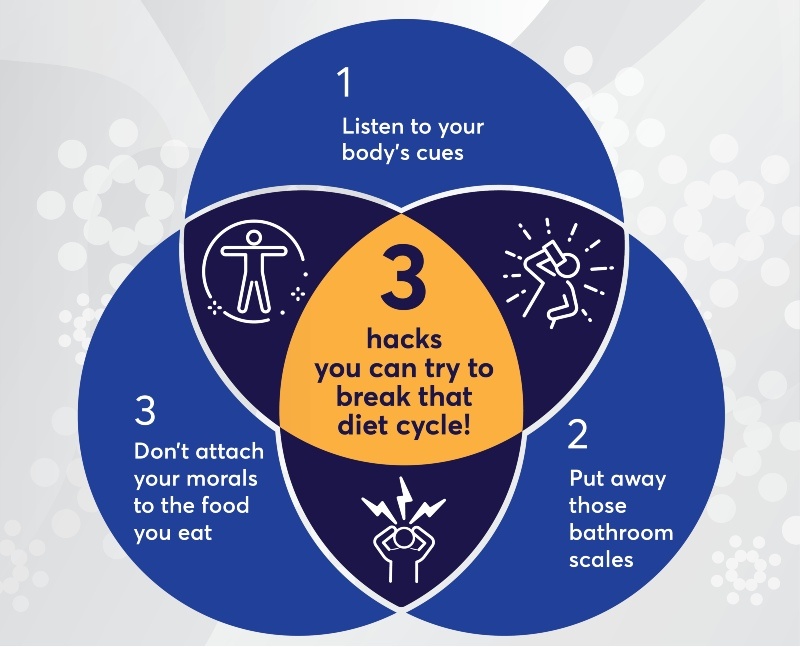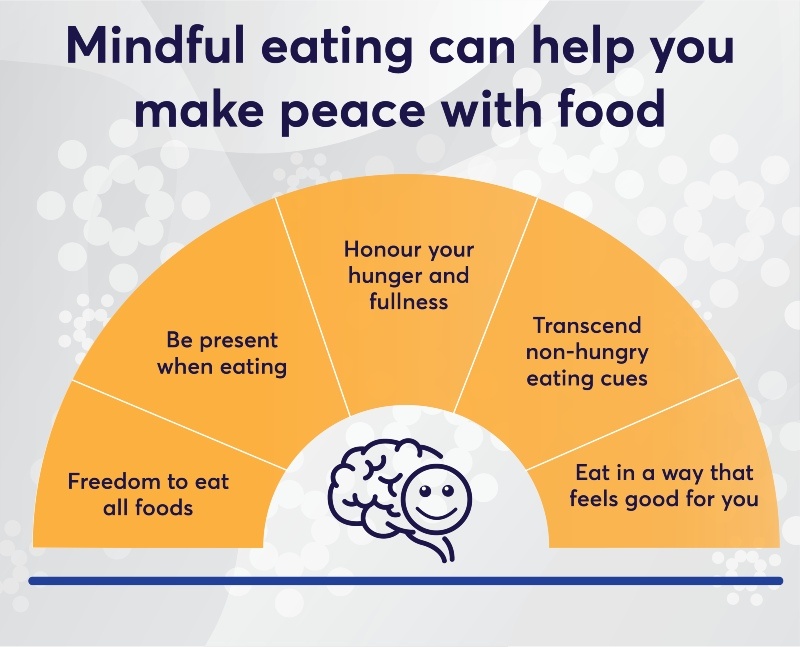- Home
- Mind & body
- Break up with dieting and still enjoy healthy, delicious meals!
At CBHS we help you manage your health challenges. We believe in offering you the services, support and tools you need to live your best life.
Our Better Living Programs are available to support eligible members towards a healthier lifestyle. Each Better Living Program is subject to its own eligibility criteria.
Contact us for more information and to confirm your eligibility for a program.
Break up with dieting and still enjoy healthy, delicious meals!

For a lot of people, constantly trying to lose weight can become an unhealthy habit that’s often hard to break.
Of course, diets can play a role in keeping your healthy weight goals on track. However, if you find yourself on a merry-go-round of crash diets, regular detoxes, and endless calorie-counting, it may be time you changed your mindset and adopted a healthier approach to food.
If you’d like to start enjoying the experience of eating again, if you’re tired of dieting, weighing yourself and constantly thinking about your body – this article could be just the inspiration you need to fall in love with food again.
“The demands of dieting and always watching your weight can start to take its toll on your physical and mental health.”
Society pressures, the diet culture and the value we place on being thin
Understanding the reasons behind our desire to diet is a step in the right direction if you’re ready to ‘break up with dieting’. Social media, fashion and society’s obsession with being thin can all influence the way we see our bodies.
In fact, a lot of us may feel the pressure and the need to restrict our food intake to achieve ‘the perfect weight’. Essentially, our perspective of what is healthy eating has been skewed or influenced by diet culture which can trap us in the diet cycle. Often this is because we focus on external cues like the scales to decide when or how to eat and how to feel about our body.
A lot of us also look to fad diets and social media personalities for guidance and steps to getting ‘the perfect body’. Unfortunately, there’s no guarantees the information they provide is based on evidence-based health and dietary advice.
What is dieting?
When you’re on a diet, you’re consciously and continuously trying to control your eating so that you can lose weight or prevent weight gain. You may follow strict meal plans that leave no room for flexibility. Or, you use negative terms like, ‘cheat days’ to describe the moments where you ‘allow yourself’ a slice of cake or your favourite takeaway meal.
In other words, diets are any eating patterns you follow with the intention of losing or controlling your weight.
Dieting behaviours can include the following:
- Counting or limiting calories
- Skipping meals or delaying your meals
- Not allowing yourself to eat certain foods
- Going on regular detox diets.
The diet rollercoaster can keep food on your mind day and night
Having an unhealthy relationship with food can put your thoughts into a tailspin where you’re constantly thinking about food, day and night.
Do any of these sound familiar?
- You go to bed each evening feeling guilty about what you ate during the day.
- The next morning you promise yourself you’ll be ‘good’ today.
- You feel totally lost without food rules.
- You get worried you’ll ‘slip up’ if there are no dietary restrictions in place.
- You miss key moments in life like special social occasions and dinners out with loved ones because gatherings where food is involved can be ruined with guilt or stress.
Answering yes to any of the above could mean you’re letting a focus on food (or not eating food) take over your life.
“Diets can make you feel like you’re missing out on life! Social events, favourite meals – everything gets put on hold when you’re dieting.”
An endless cycle of weight loss and gain
Diets do work – in the short term. However, if you keep yourself from enjoying a snack now and then, you may feel deprived and more open to temptation – where’s that jumbo packet of cookies hiding?
Plus, the problem with crash diets or unsustainable eating patterns is that if you stop, the weight you lost creeps back on again. And this is the never-ending diet cycle. It’s not a happy place to be, especially if you’re hard on yourself for not following that diet ‘perfectly’.

Often, we may feel like we’ve failed because we don’t have enough willpower to stick to the diet or we try and compensate for our ‘mistakes’ by going on an even more restrictive diet next time. If you’re someone who has done ‘yo-yo’ dieting with little or no success, you’ll know how frustrating this can be.
So, what’s the solution? Two words, normal eating.
What is normal eating?
If you’ve been ‘a chronic dieter’ you may not even realise that your idea of normal or healthy may be quite skewed. Normal eating is quite flexible simply because it responds to your:
- Hunger
- Schedule
- Emotions
- Accessibility and proximity to food.
When you ‘eat normally’ you don’t feel too much distress, guilt or shame for what you have eaten.
“Did you know? Eating for pleasure or emotional reasons is normal as long as you’re not using food as the only ‘coping mechanism’.”
Three hacks you can try to break that diet cycle
1. Listen to your body’s cues
You were born with the ability to listen to your body for the regulation of your appetite and weight. Unfortunately, you may have programmed your body and mind to override this because of life experiences like:
- You were brought up to finish everything on your plate.
- Your family constantly offers you food and you feel bad for saying no.
If these experiences sound familiar to you, this may be where you’ve learnt to override a full stomach – and keep eating well past the point of satisfaction. Or perhaps you’ve decided to fast because summer is ‘just around the corner’. All these situations can make us miss the subtle appetite signals and body cues causing us to eat when we’re not even hungry or restrict our food intake when we are.
The good news is that you can ‘re-program’ your body and mind back to its ‘original setting’!
- Start by eating well at least every four hours or so
- Check into your hunger and fullness cues, regularly.
Checking in with your body cues can help you to understand different levels of hunger and fullness and how to respond appropriately. Are you starving? Or just a little peckish? Being aware of your varying degrees of hunger can also help you distinguish between physical hunger and emotional hunger.

2. Put away those bathroom scales
Stepping on those scales several times a week can cause you more harm than good. What happens when you see your weight going up each day? Are you discouraged? Motivated? Does your fluctuating weight make you want to comfort eat? Or, do you panic and restrict your calories even further?
On the other hand, if the weight is going down, some people might feel excited, overjoyed and even relieved. And then, your mood for each day can become tied to the number on the scales.
The truth is, you can’t technically control your weight – but you can control your behaviour. That’s why setting yourself behavioural goals are more effective and motivating for long term change.
3. Don’t attach your morals to the food you eat
Sometimes making a mistake on your diet such as eating a piece of cake when you’ve sworn off sugar, can feel like a reflection on who you are as a person. This result is shame, guilt or even despair. The risk of failure is driven by fear so when you fail, you may feel the need to punish yourself perhaps with exercise or skipping meals or choosing foods that are ‘guilt-free’.
Who would have thought guilt was a food ingredient? With conscious attention, you can overcome any automatic associations and moral judgements you may have on foods. And you can start having a healthier relationship with food – free of judgement!

The three ‘diet paradoxes’ that can keep you stuck in the diet cycle
1. The ‘last supper’ effect
You know that feeling you get before you go on another diet? You want to eat and enjoy all your favourite so-called ‘naughty foods’ – the cakes, chips, fast food – because you know you’re about to deny yourself for a while.
2. The ‘forbidden fruit’ effect
When you restrict or forbid certain foods like chocolate, pasta, bread and ice-cream, but all you can do is think about eating them. Absence makes the heart grow fonder! And the chances of you giving in to temptation are high.
3. The ‘what the heck?’ effect
You’ve eaten that chocolate at morning tea and now you feel like you’ve ruined your diet. So you think, ‘what the heck, I’ll eat the rest of the block and get back on track tomorrow or after the weekend.’
If these paradoxes hit close to home, it’s time to remove the moral value you’ve placed on food – and make peace with your meals and snacks instead.

How do you make peace with food?
Feel free to eat all foods
Start noticing which food(s) you label as ‘bad’ and make an active choice to make peace with it. This will give you the freedom to eat any food because nothing feels particularly ‘naughty’
or ‘special’. And if no food is ‘off limits’ because of an unsustainable, restrictive diet, you’re less likely to feel triggered by the dieting paradoxes we mentioned earlier in this article.
Be present when you’re eating
When we’ve only got a short lunch break, it’s easy to eat fast and not really stop and savour every mouthful. This is far from peaceful! Mindful eating can help you stay in the moment during your meals – so your food choices aren’t impulsive and potentially unhealthy.
Honour your hunger and fullness
Pay attention
to how hungry and full you really are. This will help you stay in charge of your food choices and not be tempted by unhealthy eating habits.
Transcend your non-hungry cues
Feel like eating even when you’re
not hungry? You could be craving a meal or a snack for emotional reasons. Try and establish other ‘coping mechanisms’ for dealing with your emotions or triggers without turning to food (every time).
Eat in a way that feels good for you
Be
mindful of the foods that make you feel energised and satisfied until your next meal. If a particular meal or snack results in an ‘energy crash’ or makes you feel bloated and sluggish, avoid them.

Break up with diets for a healthier, happier you!
When it comes to weight loss and our health, dieting shouldn’t be your only focus because it can compromise your happiness, body image and the positive experience of eating. And contrary to popular diet beliefs, your willpower is not to blame –
it’s all the diet rules and restrictions which don’t support a healthy and balanced approach to eating.
Instead of checking how much or how fast the numbers on the scales change, focus on healthy behaviours to support a lifestyle
which includes:
- Nutritious meals and snacks – that can still be delicious
- Good quality and consistent sleep
- Physical activity that you enjoy like yoga or group exercise gym classes
- Stress management tools that don’t rely on food, like yoga and Tai chi.
By building a healthy relationship with food, tuning into your hunger and fullness cues and removing moral judgements on certain foods, you’ll be able to form intuitive eating habits. And with time and patience, you’ll be free of the diet cycle. Before long, you’ll trust yourself around food, enjoy greater peace of mind – and delicious meals!
All information contained in this article is intended for general information purposes only. The information provided should not be relied upon as medical advice and does not supersede or replace a consultation with a suitably qualified healthcare professional.
Sources:
https://www.cbhs.com.au/mind-and-body/blog/the-top-10-nutrition-tips-backed-by-science
https://www.healthdirect.gov.au/weight-loss-and-dieting
https://www.cbhs.com.au/mind-and-body/blog/curb-your-cravings-how-to-resist-those-snack-temptations
https://www.cbhs.com.au/mind-and-body/blog/healthier-takeaway-options-what-to-eat-on-the-go
https://dietitiansaustralia.org.au/
https://www.cbhs.com.au/mind-and-body/blog/the-a-zzzzzs-of-sleep-your-guide-to-sleeping-soundly
https://www.betterhealth.vic.gov.au/health/healthyliving/weight-loss-a-healthy-approach
https://www.rachaelhartleynutrition.com/blog/beyond-the-hunger-fullness-scale
Health and wellbeing
programs & support
You Belong to More with CBHS Hospital cover:
- Greater choice over your health options including who treats you
- Get care at home with Hospital Substitute Treatment program
- Free health and wellbeing programs to support your health challenges
Live your healthiest, happiest life with CBHS Extras cover:
- Benefits for proactive health checks e.g. bone density tests, eye screenings
- Keep up your care with telehealth and digital options
- Save on dental and optical with CBHS Choice Network providers
